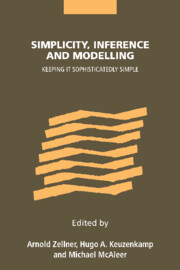Book contents
- Frontmatter
- Contents
- List of figures
- List of tables
- List of contributors
- 1 The enigma of simplicity
- PART I The importance of simplicity
- 2 What is the problem of simplicity?
- 3 Science seeks parsimony, not simplicity: searching for pattern in phenomena
- 4 A macroeconomic approach to complexity
- 5 The new science of simplicity
- 6 What explains complexity?
- 7 Occam's bonus
- PART II Simplicity in theory and practice
- Index
6 - What explains complexity?
Published online by Cambridge University Press: 22 September 2009
- Frontmatter
- Contents
- List of figures
- List of tables
- List of contributors
- 1 The enigma of simplicity
- PART I The importance of simplicity
- 2 What is the problem of simplicity?
- 3 Science seeks parsimony, not simplicity: searching for pattern in phenomena
- 4 A macroeconomic approach to complexity
- 5 The new science of simplicity
- 6 What explains complexity?
- 7 Occam's bonus
- PART II Simplicity in theory and practice
- Index
Summary
This chapter is perhaps an outlier in this volume because, though concerned with simplicity and econometrics, it is written from the somewhat distant viewpoint of general philosophy.
As many contributions to this volume show, it is hard to find anyone opposing simplicity, ceteris paribus. However, facing some choice, the recommendation ‘maximize simplicity’ strongly resembles the wellknown advice ‘maximize utility’: unless specified, the recommendation is in danger of being empty.
Everything in nature tends to become more complex
There is also the obvious paradox of simplicity: while simplicity is generally favoured, in reality everything becomes more complex all the time!
The first example is the physical evolution of the universe: since the Big Bang, more and more different types of matter and force unfolded themselves, according to the physical theories modern man believes.
In the evolution of the living, more recently developed species usually strike us as more complex than earlier ones. The same holds for the growth to maturity of an individual of a certain species: individuals, developing in a short time from a single cell to a complicatedly organized billion-cell structure, seem to favour a kind of complexity that is even beyond our present scientific grasp. Species that do not favour this, one-cell beings, strike us as primitive, even though we know very well they can kill, and can thus in a sense be ‘stronger’ than even such complex creatures as mammals.
- Type
- Chapter
- Information
- Simplicity, Inference and ModellingKeeping it Sophisticatedly Simple, pp. 120 - 127Publisher: Cambridge University PressPrint publication year: 2002



